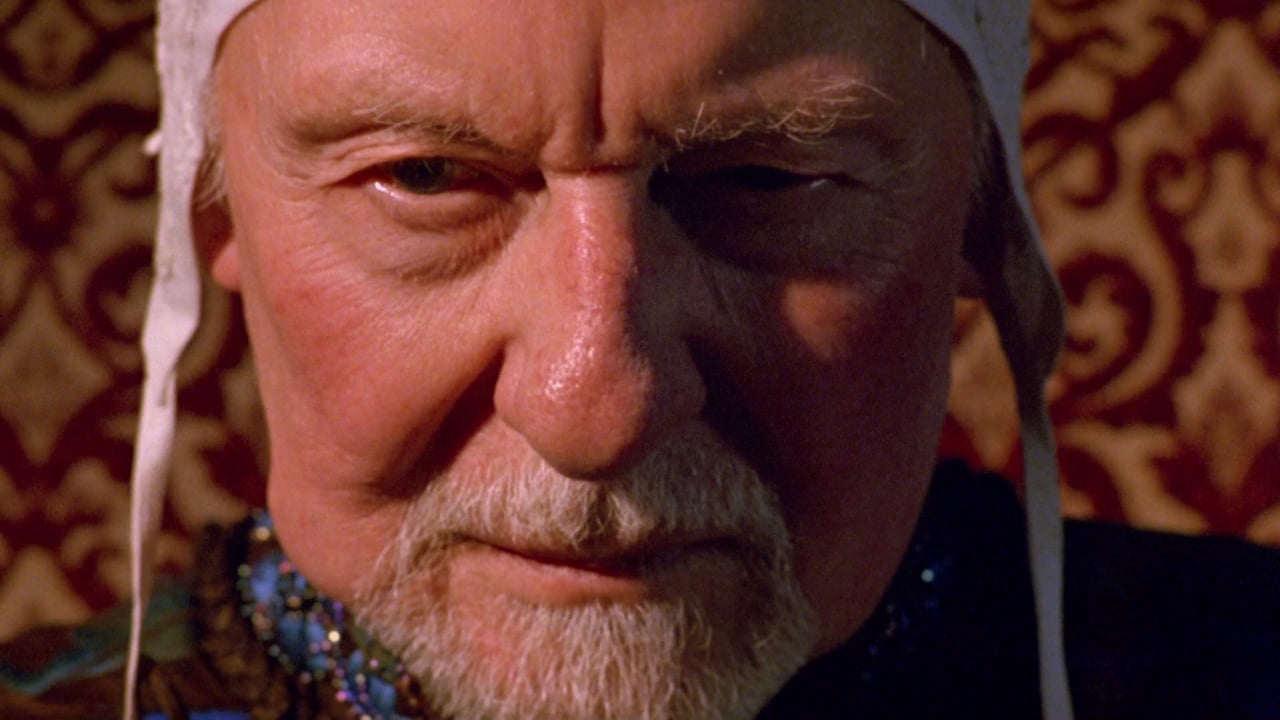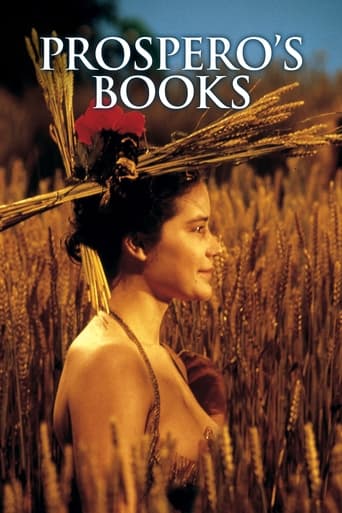



You won't be disappointed!
Better Late Then Never
It isn't all that great, actually. Really cheesy and very predicable of how certain scenes are gonna turn play out. However, I guess that's the charm of it all, because I would consider this one of my guilty pleasures.
View MoreA film of deceptively outspoken contemporary relevance, this is cinema at its most alert, alarming and alive.
View More. . . it's a pity the aesthetic choice was made to *not* tell the story.That's my take-away from last night's viewing, my first since the film's theatrical release some 25 years ago. If you know Shakespeare's 'The Tempest' you'll fill in the narrative; if not, you'll have a splendid two-hour hallucination.But 'Prospero's Books' is the 800-pound gorilla of art films. Nothing like it before or since. F'ing glorious pile of exquisity.After Peter Greenaway's stunning vision, Michael Clark's Caliban is the star, along with the naked human body in all sizes, shapes and ages -- by the army-full, non-eroticized -- marginalia etchings come to life, caryatids, collossi, etc. Gielgud's celebrated voice murmurs most of the lines, but only somebody who didn't see it to the end (or parroting somebody who didn't) will make the false claim that no actor but Gielgud speaks. The sound is beautifully engineered, vocals and music.
View MoreAn imaginative telling of Shakespeare's "The Tempest". However, that's one of the few good things I can say about it: it is inane, gratuitous and pretentious. Very little makes sense, even at the most basic of levels. Most scenes just seem to be excuses to have hordes of people, men and women, run around naked. Critics will call that bold, I call it gratuitous and meaningless.Performances are hard to judge, as it is difficult to look past the meaningless, random plot. John Gielgud provides gravitas in the lead role, but his voice seems to drone on after a while and get quite irritating. Nobody else is worth a mention.If you're looking for a good version of The Tempest, this is not it.
View More"The Tempest", in a sublime way, is both about itself and us, giving us a role inside the play itself and at the same time the opportunity to experience it from the outside; strongly about the art of telling stories and creating reality through them, Prospero is a wonderful archetype of a narrator.What Greenaway gives me is different yet much alike from what for example Tarkovsky gives, which may sound absurd considering the styles of film-making: the theatrical visual exuberance of Greenaway with overlaid images scarcely brings to mind the ethereally lingering camera shots of a Rublev or a Nostalghia. But if we go further, we notice that they are both as adventurous, going far away the horizon to uncharted visual territory. "The Pillow Book" (1996), although equally exuberantly visual, is far more accessible, and perhaps my favourite "Late Greenaway". Not that this doesn't have everything going for it, it is rather serious stuff. Sure, this is pompous and there are moments I'd rather shortened, and by the time we reach the wedding one, at least this particular viewer feels rather drained out. But this is so remarkably wonderful visually and deeply rich in its understanding/interpretation of Shakespeare that it doesn't really matter, but in other later Greenaways I don't feel as strongly about, this lack of deep-rooted humour makes them bothersome to watch. With "Prospero's Books" I'm more forgiving, I suppose, but as with some other amazing films ("A torinói ló" from 2011, for example), it can be tough to sit through.A notable thing, Michael Nyman's music. A wonderful experience on its own, Nyman's compositions have the power to amplify and annotate the images we see, and the effect works both ways. Curiously the music is taken from Nyman's "La Traversée de Paris". And the dancing is superb, as well as Sacha Vierny's work, that is, how it dwells in the space that surrounds it.I don't think it's easy to find a proper DVD of this, let alone a Blu-ray. I have this on an Italian DVD that, unfortunately, has only the dialogue in Italian, as well as a DVD released in Scandinavia. It's not amazing by any means, but I'm glad it exists. The back cover of the DVD has one of the funniest things I've seen. It actually states that the film has been directed by "the four-time Academy award winner Peter Greenaway".
View MoreI think some knowledge of the play is important here. The Tempest was the last one that Shakespeare wrote alone near the end of his career and though short and simply structured, one of the most complex. It is about many things but most pertinently here for us, about the author creating, gathering the story around him and bringing characters to him to enact it. It is about the author as magician effecting control upon the fates with his obscure knowledge of spells by which he shapes the world to his liking. And eventually, it is about wilfully giving up the spells that sustain the illusion in which we are kept prisoners.Into this loaded context that Shakespeare wrote about himself comes Peter Greenaway, with his own obsessions about the creative process. He has a perfect grasp of what's going on here; the film opens with Prospero writing the action with himself in it.The film is not called by its original title though, it's about Prospero's books. 24 of them in all, the first 22 comprising vast, arcane knowledge (the knowledge that cost Prospero his dukedom) from which are born the illusions that motion the flow. The rest of the characters with the important exception of Caliban, are passive participants, mere pawns to be binded or moved according to the higher whim that creates the story.There is one scene that threatens to kill this off. It's the protracted wedding sequence, so decadently opulent, with hordes of plumed naked bodies swirling in huge rooms. But it ends with Prospero invading this scene which he has imagined, pausing everything. The spectacle is hidden from view, behind mirrors, then behind a curtain, as Prospero delivers the beautiful solliloquy about life as a dream that ends with sleep.It presages, for the first time with clarity, what is important for me in this work. The strange, mythic island as the mind, where as other Prosperos we pace up and down setting the stage for the illusions we choose to inhabit. Our grieves and perceived slights against us, our cravings and desires.And the path leading out of it again, first the reconciliation not with the actual offenders (the Alonsos and Antonios) but our own figments of them inside the mind. And then by the destruction of our ideas and catalogues about things so that we may return to the things themselves, now receptive to what they have to offer.All 22 books are destroyed by Prospero eventually, who gives up his magic. Another 2 books become available then, one is about games, the games that life is about. The other is what we come out of the ordeal with, the reward for our efforts that may enrich others in turn. Here encoded as a book about the actual Shakespeare play, where the corresponding pages are blank as yet-to-be-written.Some of the filmmakers I most cherish belong in two groups. One is about seeking true perception, the things as they are (and us). It is about dismantling the cluttered fictions we weave around and associate with them, which obscure the true meaning whereby the things mean themselves to us. It is about removing the mask so that we may have in-sight of the actual shape.Another group of films I am drawn to assail those same preconceived notions by fabricating others to replace them. Stories within stories, fictions passing as real, dreams as realities, various layered patterns. The idea here is that by removing one mask, the synthetic, we discover another hiding underneath. It is also about removing and revealing, about the distinction between an apparent and ultimate reality (this is not merely for the sake of philosophical discourse, but as visual addendums to what is actually realized in meditation).Greenaway is one of the most prominent of the second group. So far, however, I had only been truly struck by The Draughtsman's Contract and found the rest interesting but not something to make my own. This is the second that captivates me, but a more difficult film than Draughtsman, more oblique, more impossible with annotated images.But as great in its notions about the nature of reality. It's full of frames within frames, indeed some of the nested ones are observed by a chorus from the edges of the outer frame. And there is an image of Prospero working the story in his study as a boxed stage within a bigger one.And more beautiful in how the story is envisioned. What must have been, in Shakespeare's time, sparse and invoked in the imagination, is here made alive, all of it. The toy boat tossed about in a miniature tempest, the drowned men salvaged by spirits of the water. Caliban, a brute in the original, here a most graceful dancer.And a most thoughtful transition within Greenaway. Draughtsman and A Zed and Two Noughts ended with the destruction of the creator and his consciousness that fought to arrange the world. This one ends with the destruction of the arrangements by which the creator would arrange the world, and the creator survives by arranging himself in a way that he enters the world clear, empty, empty-to-be-filled again.
View More